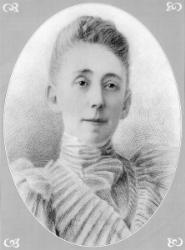
Maria Howard Weeden, the daughter of Jane Eliza Brooks Urquhart and Dr. William Donaldson Weeden, was born in a house (now the Weeden House Museum) at the corner of Gates and Green Streets in Huntsville, Alabama. She lived there continuously until her death with the exception of a short time during the War Between the States when she lived in Tuskegee, Alabama. She is said to have been frail in body with an almost ethereal daintiness, yet she used her mannish name all of her life.
An artist and a poet, Howard Weeden received instruction in art from William Frye, a prominent portrait painter who was widely recognized in the Tennessee Valley area. Her skills with brush and pen were exhibited through hand-painted cards for special occasions, elaborate booklets for weddings, dinner cards, favors for parties, and cards of condolence. As early as 1868, her stories appeared in The Christian Observer, a Presbyterian newspaper. Her stories, under the pseudonym "Flake White," continued to appear in that paper for the next twenty years. Ms. Weeden's love of flowers was reflected in her collection of paintings of 208 varieties of wildflowers. In her Book of Roses, she illustrated the many varieties in her mother's garden.
In 1893, she attended the Columbia Exposition in Chicago and concluded that her work deserved a wider audience. She had realized that the simplicity and poignancy which she sought to capture in her work elicited a response distinctly different from that of her contemporaries. In 1895, seven of her best portraits were shown in the Berlin gallery of Edward Schulte in a "Howard Weeden Gala." The exhibit was so successful that Ms. Weeden received a large number of orders for her work. She later had a showing in Paris.
She published four books: Shadows on the Wall (1898), Bandanna Ballads (1899), Songs of the Old South (1901), and Old Voices (1904). Joel Chandler Harris wrote in the introduction to Bandanna Ballads, "The art with which the facts are set forth is so felicitous in its touch, so faithful and so informing, that it goes deeper than character and individuality; it revives and resurrects the period; in some mysterious way, it restores the atmosphere and color of the time. And each portrait stands out as a little masterpiece, harmonious, powerful, charged with feeling, and illuminated by the imagination that makes its creations more real than life itself."
Howard Weeden, using her largely self-taught talents with brush and pen, made a unique contribution to an era in the history of the South, with faithfulness to fact and with respect and dignity to the individuals recorded.
Bibliography
Patrick, Pamela Cowie. Maria Howard Weeden: the Gentle Artist. Huntsville: Writers Consortium Books, 1989.
![]() Other Inductees
Other Inductees
![]() Alabama Women's Hall of Fame
Alabama Women's Hall of Fame